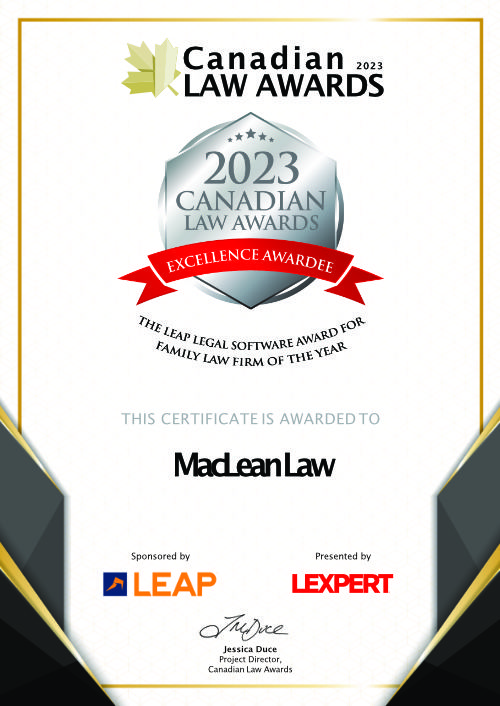
Child Parenting Resist and Refuse Dynamic disputes are now receiving more focus from psychological experts, lawyers and Judges. In today’s blog senior family associate Peter Graburn explains this new area of family law. MacLean law handles high net worth and high conflict child parenting time and child guardianship disputes.
Vancouver Calgary Parental Alienation
“Parental Alienation” – a very strong term that is (unfortunately) heard a lot in high conflict family law matters these days. Studies (ie. Bala et al., Canadian Research Institute for Law and Family) have shown that parental alienation was found by the Court to have occurred in between 22-25% of the cases where it as alleged. It is devastating to children, and abuse by the alienating parent. But what is Parental Alienation, and can it be distinguished from other forms of behavior (by children) or conduct (by parents) against the alienated parent?
Child Parenting Resist and Refuse Dynamic Lawyers 1 877 602 9900
Alienation vs. Estrangement
As indicated in a previous trilogy of articles on this matter in Best Parental Alienation Lawyer Tips, Calgary Parental Alienation Estrangement Lawyers : How to deal with Parental Alienation, “Parental Alienation Syndrome” (or PAS) occurs when an alienating parent naively or intentionally and systematically attempts (often during high-conflict custody disputes) to negatively influence the child’s relationship with the other parent, often leading to the complete breakdown of that relationship. This should not be confused, however, with “Parental Estrangement”, where for other reasons (ie. age, gender, common-interests, parenting capacity deficiencies, etc.) the child naturally prefers to spend more time with one parent than the other. See this recent article from Psychology Today.
Resist & Refuse Dynamic Parental Alienation 1 877 602 9900
But is there a middle ground between where an alienating parent actively influences a child against the other parent (Parental Alienation) and where a child simply prefers to spend more time with one parent (Parental Estrangement)? The answer is – yes.
Another term that is increasingly being heard in high-conflict family law matters is the “Resist & Refuse Dynamic”. This is a term that is used to describe when a child actively resists or refuses contact with a parent because of the rejected parent’s behaviour (as opposed to the alienating parent’s behaviour), including domestic violence, child abuse, poor and emotionally intense parenting (ie. overly strict, immature, emotionally distant, substance abuse, etc.) or lack of prior attachment with the rejected parent. Here, the child may logically and justifiably prefer the favoured parent not out of natural estrangement, but because of the poor parenting abilities and actions of the rejected parent.
Child Parenting Resist and Refuse Dynamic Lawyers 1 877 602 9900

Research (see: Fidler and Bala, Family Court Review, Vol, 58, No 2, April 2020) has found that many factors must be considered as to why a child actively ‘refuses and resists’ parenting time with a parent, including:
- Communication;
- Child factors (age, cognitive abilities, etc.);
- Parental conflict (before and after separation);
- Sibling relationships (positive and negative);
- Preferred parent factors (negative beliefs, behaviours, personality disorders);
- Rejected parent factors (negative beliefs, behaviours, personality disorders);
- The adversarial Court process (‘Litigation Abuse’);
- Third parties (such as professionals and family members aligned with one “side”);
- Lack of functional co-parenting, poor or conflictual parental styles.
As we indicated in a more recent article on this topic Best Ways to Stop Parental Alienation, Courts are much more willing these days to take direct and decisive action to try to prevent Parental Alienation from causing further damage to the alienated parent-child relationship, including increasingly the use of early intervention of Parenting Experts (ie. therapists and counsellors) for both the parents and children.
But there is also the concern that the use of the term “parental alienation” oversimplifies or exaggerates the reason for the child’s rejection of a parent (except in the most blatant and worst cases), with the perhaps more accurate (in most cases) term “resist / refuse dynamic” becoming the more commonly used and accepted terminology to understand a child’s resistance and refusal to have contact with a parent.
Vancouver Child Parenting Resist and Refuse Dynamic
The other concern is Parenting Expert’s increasing refusal to determine whether actual “parental alienation” exists in any particular family situation without conducting a full bilateral (in Alberta, Practice Note 8) assessment of the whole parental situation.
Welcome to the new “Resist and Refuse Dynamic”. Is it synonymous with “Parental Alienation”.
If you have a Child Parenting Resist and Refuse Dynamic dispute contact us early on to prevent more damage to your children.








